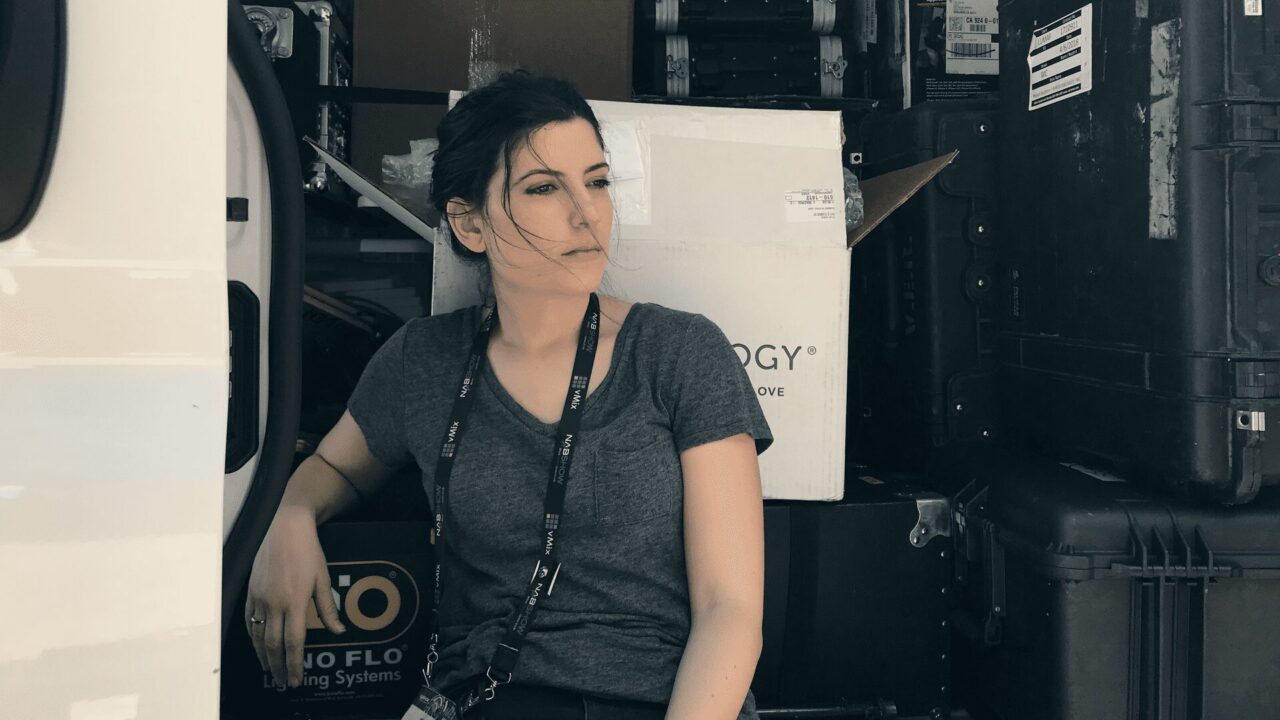Being a CODA (Child of Deaf Adults) herself, filmmaker Jessica Perlman knows the challenges of navigating between the Deaf and hearing worlds. In her new short film, Talk, Perlman offers an intimate and thought-provoking exploration of the complex nature of communication, especially for those constantly translating between two worlds. Vividly portraying how even the most straightforward situations can be layered with meaning and miscommunication, Talk will resonate deeply with everyone seeking it out.
In our exclusive interview, Perlman opens up about her personal experiences and how they influenced her creative process, bringing a unique perspective to filmmaking. As the film’s writer and director, Perlman, shares, “For a Deaf audience, I hope the film makes them feel seen, their lives centered, and even find humor in the relatability of difficult situations like this.”
Cinemacy: It’s a pleasure to meet you, Jessica! I’d love to hear more about what inspired you to create your new short film, Talk.
Jessica Perlman: One of the hardest things for me to explain about being a CODA, is the management of all the conversations happening at once and how they funnel through you. So I decided to show it! By putting the audience within the layers of words, meanings, and contexts– I believe it gets across how difficult it is to manage, yet still hold your place in all of it.
Cinemacy: The film’s premise involves a seemingly mundane issue—a broken air conditioner—but it evolves into much more. How did you decide to use this particular scenario as the foundation for the tension in the story?
Jessica Perlman: This scenario came from wanting to use the line about D. R. Horton. It was an experience I had when I was translating for my stepdad about his home, and I thought he signed “Doctor” Horton instead of the name of the home manufacturer. One of those embarrassing moments you can’t forget, but that’s how I learned what D. R. Horton is!

Cinemacy: Talk explores the breakdown in communication through the lens of a Deaf man and his translator. As the film’s writer, can you talk about the challenges you faced in conveying this complex story visually, without relying heavily on dialogue?
Jessica Perlman: That was the fun part for me! I chose to frame up the Deaf character in ways that felt confined, pressed up against, and stifled. A few shots even frame out his hands. A fluent speaker can still understand what he’s signing, but he’s cut off from communicating with the repairman. That also meant performances were key in capturing the frustration seeping through so that you didn’t need to understand the words to understand the character.
Cinemacy: Talk focuses on the challenges CODAs often face when navigating between the Deaf and hearing worlds. Can you discuss how these experiences shaped your perspective as a filmmaker and storyteller?
Jessica Perlman: As a CODA, I have a unique point of view in my storytelling. Being able to hear and sign placed me directly in the middle of two different worlds, often having to translate between the two. So this translator role I grew up with was one of my biggest draws to directing. A director has to translate from page to screen, and from their vision to their collaborators. Additionally, the nature of ASL is not just visual but performance-based. I think this has allowed me to identify and craft great performances. With every story I tell, I harness these inherent skills and the desire to center stories from unexpected places.

Cinemacy: As a director, what did you learn during the making of Talk that surprised you or challenged your expectations?
Jessica Perlman: My experience making Talk was quite extraordinary. This was the first time I could work with Deaf talent, and I couldn’t believe how quickly Jacob and I adapted. We came up with our signs for film-specific words. I was directing the performance from behind the monitor while signing at the same time. It felt like speaking my native language on set for the first time. Something I never thought could be possible. It opened my mind to what could be accomplished in this dynamic.
Cinemacy: What is the one key message or feeling you hope audiences walk away with after watching Talk?
Jessica Perlman: I hope this film will engage hearing audiences in a conversation without their usual tools– putting together the clues to understand not only the words but the characters’ individual experiences. For a Deaf audience, I hope the film makes them feel seen, their lives centered, and even find humor in the relatability of difficult situations like this.

Additionally, for all the CODA’s out there, this film is from our point of view. We are often involuntary witnesses to discrimination and prejudice at young ages, which can form a strong impact leaving them to deal with uncomfortable situations on their own. Even though we have a quick moment with our characters, I believe this short film will make a lasting impact on audiences of all types.
Cinemacy: Finally, do you have any future projects planned or dream goals?
Jessica Perlman: I’ve developed a feature based on the short film that would be a dream to shoot. I also have a couple of other shorts I’ve written and developed that I’m looking to shoot this coming year; specifically one about language acquisition in Deaf children.
For more about Jessica Perlman and ‘Talk,’ visit https://www.jessicalperlman.com/talk-short-film


Yo, YY777download! This site’s a lifesaver. Seriously, gets me my fix quick! Check it out yy777download.